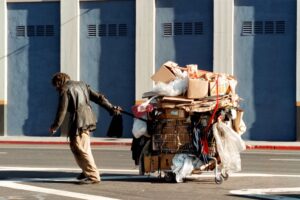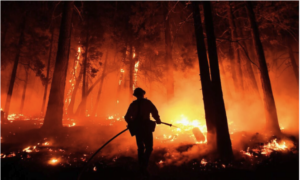The fire still engulfing large swaths of Los Angeles has done more than destroy homes, businesses, and livelihoods. It has scorched the whole dream of Los Angeles, part of a downward spiral unfolding for a generation — and cast into severe doubt the city’s ability to host the 2028 Olympics.
Fires have been a reality in California for at least 20 million years. In my own, far shorter lifetime, I have seen numerous blazes, and covered several on television. They aren’t predictable, but you know when they are likely to occur. They aren’t preventable, but you can be prepared for them. Fires, floods, and earthquakes — disasters are us, and that has been the case as LA grew over the past century.
This time around, city and state leaders bear a heavy blame for a shocking lack of preparation, given weather conditions that were well predicted and have caused disasters in the past. As Traci Park, a member of the City Council, recently suggested, the fires revealed “chronic underinvestment in our critical infrastructure”. Perhaps the most remarkable failure was the lack of pressure to get water out of hydrants.
This disaster reflects the failure of the one-party progressivism currently dominating governmental structures. In this worldview, basic infrastructure is less important than addressing climate change and “social justice”; measures such as building dams or hardening the electric grid are demoted to a secondary role, with catastrophic effects.
While the fire may not reverse this mentality, it has demolished the reputations of two major adherents: LA Mayor Karen Bass and California Gov. Gavin Newsom. Even as federal authorities warned of fires, Bass elected to take a junket to Ghana at the behest of President Biden. She came back to a city ablaze, with thousands of Angelinos having lost their homes and businesses.
During her tenure, Bass, whose political icon was Fidel Castro, had cut the fire department budget, signed off on lavish, and largely unsuccessful, programmes to address homelessness, and crowed about how the city would defend illegal immigrants. Meanwhile, everything in the city — from parks to schools — is worn and in a state of ill repair.
Nor has this regime done much for its poorer residents, which it claims to care most about. LA suffers among the highest poverty rates in the state and the worst in the country. South-central LA, the epicentre of two of the worst riots in American history, is now poorer in relation to the rest of the city than before those upheavals. It remains the second worst homeless capital of America and builds far fewer new housing per capita than almost every other large US metro area. The city still wants to raise taxes amid a deepening budget hole .
In turn, Newsom presides over a California with roads now among the worst in the country and a high-speed bullet train plagued with endless delays and massive cost overruns. Precious little has been done to boost water systems critical in a perennially drought-threatened state. And state environmental policies, as the Little Hoover Commission found, have contributed significantly to the severity of conflagrations, largely by blocking controlled burns and allowing the pile-up of dry, combustible brush.
It turns out that governance matters. The Golden State’s ascendency was a product of a state that the great liberal economist John Kenneth Galbraith in 1971 described as run by “a proud, competent civil service”. This legacy reached its zenith not under California Gov. Ronald Reagan, as some conservatives might wish, but under the responsible liberal regime of Pat Brown, building excellent roads, addressing state water needs, and fostering what Galbraith hailed as among “the best school systems in the country”.
In contrast, California’s government now has been ranked by Wallet Hub as the least efficient in delivering services relative to tax burden. The primary education system stands now among the worst in the country, particularly for poor and minority students. Simply put, progressive Democrats don’t seek to build capacities that made life better for people, unlike their predecessors.
Such degradation is thrown into sharp focus by disasters. In the aftermath of the 1994 earthquake, Mayor Richard Riordan was everywhere, and repeatedly questioned bureaucratic roadblocks that would slow recovery. With the help of Gov. Pete Wilson, he managed to have a critical section of freeway connecting the Westside and downtown rebuilt in a remarkable 66 days. Under Riordan, much of the city, including sections that burned in the 1992 riots, was rebuilt, in large part with private investment.
Such effective political leadership is all but gone from both Sacramento and the LA City Hall. Yet LA’s decline isn’t foreordained — a fact highlighted by the rise of the largely Latino industrial cities outside LA’s jurisdiction. As you enter well-run cities like Southgate, suddenly the streets are well-paved and there are few vacancies, with virtually no graffiti or homelessness. An exhaustive study by Chapman University researcher Bheki Mahlobo found that these cities generally outperform adjacent regions of Los Angeles, and even the city itself, in retail sales, labour participation, crime rates and poverty. Downtown LA’s office vacancy rate is almost three times that of the independent cities just to its south.
Yet the prospects for change, both in the state and the city, aren’t favourable, the recent fire notwithstanding. Not that Californians or Angelinos are happy with the status quo. Only 40% of California voters approve of the legislature and almost two-thirds tell pollsters the state is heading in the wrong direction. As misrule persists and opportunity diminishes, the young head for the exits. Since 2000, LA has lost 750,000 people under the age of 25.
Yet in both California and LA, the progressive stranglehold seems strong enough to survive a nuclear war. After all, the state still voted overwhelmingly for Kamala Harris in November, deposed several GOP members of Congress, and maintained lopsided control of both state houses; Democrats boast four times as many voters as Republicans in LA.
Which brings us to the 2028 Olympics. The choice of LA to host the games seems hubristic, to say the least. The Olympics put enormous strain on any city: from law enforcement to traffic management to logistics. Yet this isn’t the LA economy and government that hosted the 1984 games, but the sadly diminished city of today. And even if a disaster of some kind doesn’t break out while millions of visitors are in town, it’s hard to see how the city revives itself in time.
In the past, the city and its economy were able to bounce back, even after earthquakes, fires, and riots. Without significant political change, the chances of that happening now are low. The current regime is more radical than ever, with four members of the far-Left Democratic Socialists on the 15-member council. Most of the rest are more mainstream progressives; none is a Republican.
The ascendant Left will inevitably blame the fires on climate change, ignoring the more obvious and proximate role of government mismanagement. As for the poorer Angelinos displaced by the fires, we can expect the growing progressive influence to replace the lost housing with publicly financed products. The goal is to turn a city built around single-owned houses into something more akin to life in the Soviet Union.
If there is a silver lining, it’s that the fire’s encroachment upon the city’s upper classes will prompt a rethink. This time, the damage to ultra-affluent areas like the Palisades and the Hollywood Hills brought governmental incompetence literally to the doors of the progressive elites, who thought themselves safe in their enclaves — just as they protected their kids by keeping them out of the miserable LA schools.
Clearly, a new more pragmatic mindset, not necessarily a conservative one, is desperately needed. The great entrepreneurial city must rediscover how to combine business-friendliness with good infrastructure. The opportunity is there to rebuild large areas of the city and rethink ways to prevent similar disasters. But unless state and city leadership change direction, the process will be slow, painful, and ultimately self-defeating.
Correction: Due to an editing error, an earlier version of this article misstated California Gov. Pat Brown’s first name.
Disclaimer
Some of the posts we share are controversial and we do not necessarily agree with them in the whole extend. Sometimes we agree with the content or part of it but we do not agree with the narration or language. Nevertheless we find them somehow interesting, valuable and/or informative or we share them, because we strongly believe in freedom of speech, free press and journalism. We strongly encourage you to have a critical approach to all the content, do your own research and analysis to build your own opinion.
We would be glad to have your feedback.
Source: UnHerd Read the original article here: https://unherd.com/



